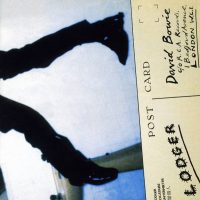 Written by: David Bowie, Brian Eno
Written by: David Bowie, Brian Eno
Recorded: September 1978, March 1979
Producers: David Bowie, Tony Visconti
Released: 25 May 1979
Available on:
Lodger
A Reality Tour
Personnel
David Bowie: vocals, pianoGeorge Murray: bass guitar
Sean Mayes: piano
Dennis Davis: drums
Tony Visconti: mandolin, vocals
Adrian Belew, Carlos Alomar: mandolin
Brian Eno: ambient drone
‘Fantastic Voyage’ is the opening song on Lodger, David Bowie’s 13th studio album. It is based on the same chord structure as ‘Boys Keep Swinging’.
It’s almost quaint, this one. It has a strong feel of the Fifties variety show to it. A cavil in passing – if I’d been in the position of the mid-Sixties Rolling Stones, I definitely would have gone on the Sunday Night At The London Palladium show’s revolving stage.They had refused to stand on the roundabout with the other acts at the end of the show, as it didn’t fit in with their rebellious image. I was surprised to read that the American entertainer Judy Garland also refused a whirl, as she was too emotionally upset. Who knew?
I would have been shyly clawing my way past Jimmy Tarbuck to get on. I remember my mother being excited about the first time this show appeared on television in 1955.
My father had bought our set for Princess Elizabeth’s coronation in 1953 and it had opened up a new world for us. Guy Mitchell was apparently an exciting part of this world as my mother went all schoolgirl when he came on screen and sang ‘She Wears Red Feathers (And A Hula Hula Skirt)’… Thinking about it, Guy Mitchell would have done this song proud.
Mail Online
Well, that is definitely pop. What’s interesting about that is the logistics. We played the same chord sequence four different ways and the same thing exactly occurs elsewhere on the album. You’ve got to spot it. I wanted to put some sort of point of view forward that was in the narrative fashion right at the front of the album. It starts veering off to the obscure after this, but it’s a pretty straightforward song about how I feel, in a very old-fashioned romantic fashion. One feels constantly that so many things are out of our own control and it’s just this infuriating thing that you don’t want to have their depression ruling your life or dictating how you will wake up each morning.
Melody Maker, 19 May 1979
‘Fantastic Voyage’ combines the personal and the political. Written during the Cold War, its reference to missiles, fatherless victims and genocide were clearly inspired by the political tensions of the time, but there is also a warmth and empathy throughout: Bowie sings tenderly of loyalty, dignity, and resisting depression. The helplessness and fatalism of his everymen stood in contrast to the leaders who waged war and placed civilisations in peril, and Bowie was clear upon whose side he was.
It’s a pretty straightforward song about how I feel in a very old-fashioned romantic fashion. One feels constantly that so many things are out of our own control, and it’s just this infuriating thing that you don’t want to have their depression ruling your life or dictating how you will wake up each morning.
The Complete David Bowie, Nicholas Pegg
The title may have been inspired by the 1966 American sci-fi film of the same name, in which miniaturisation technology developed by American and Soviet Union military forces is used to save the life of a dissident scientist. Isaac Asimov wrote the novelisation, which was published six months before the film.
The chords of ‘Fantastic Voyage’ were almost the same as those for another Lodger song, ‘Boys Keep Swinging’. The two songs follow a nearly identical sequence, although a B flat chord in ‘Boys Keep Swinging’ was amended to a G minor on ‘Fantastic Voyage’.
By changing the production, tempo, and melody, few noticed the similarity. During the Lodger sessions a third song was written using the same chords, but was left unfinished.
‘Fantastic Voyage’ was one of three songs written with the same exact chord changes. It was an experiment. Always experimenting. ‘Boys Keep Swinging’: that’s the same changes and structure. Then there’s a third which didn’t make the album: not finished.
It was a trick Bowie had previously deployed on ‘Stay’, the backing of which was based on ‘John, I’m Only Dancing (Again)’. The best-known instance, however, is probably the two versions of ‘It’s No Game’ on Scary Monsters… And Super Creeps, which had the same melody and backing track, but were made to sound quite different through the performance and production.
This song’s chord structure appeared on the album Lodger in two forms. First, as it appears here and then further in as ‘Boys Keep Swinging’ (they were men’s dresses, I tell you). Both the tempo and top-line melody are rewritten.I did this again on the album Scary Monsters… And Super Creeps. It proved nothing.
Mail Online
This was not the only instance on Lodger of song recycling. ‘Red Money’ used the backing track of Iggy Pop’s ‘Sister Midnight’, co-written by Bowie and Carlos Alomar, and recorded for Pop’s 1977 album The Idiot.
Another Lodger song, ‘Move On’, was based on ‘All The Young Dudes’. Bowie played the 1972 song backwards and asked guitarist Carlos Alomar to write down the chords. He then instructed the studio musicians to play the new sequences.
‘Fantastic Voyage’ could quite easily have turned up on Hunky Dory. This album seems to contain things from lots of different areas of my career.”
Melody Maker, 19 May 1979


